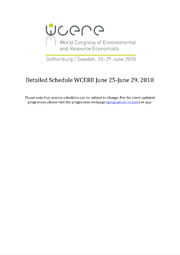Pre-conference session: Economic instruments for water-scarce cities – experiences and implications
Venue: SEB Hall (E 45), School of Business, Economics and Law, University of Gothenburg
Time: Monday, June 25th, 14.00 – 17.30
Background: The news that around 4 million citizens of Cape Town could be without water as “Day Zero” approached made the headlines across the world early this year. Alleged reasons included the worst drought in recorded history coupled with inadequate infrastructural investments and management strategies to cope with the city’s rapidly growing population. Unfortunately, Cape Town is not alone. Water scarcity is a growing issue for cities around the globe. As we gather for the World Congress for Environmental and Resource Economists this session will draw on the experiences from Cape Town and beyond to discuss the role of economic instruments. While regulations and restrictions have been used to a large extent, the session will emphasize the experiences and potential of tariffs, incentives and behavioral nudges to both address acute shortages and to ensure that the rapid expansion of urban areas around the world are done in a way that is the well adapted to the growing concerns of water scarcity. For a more elaborate background see our blog.
Keynotes:
14.00 Dr Claudine Uwera, Minister of State in charge of economic planning, Ministry of Finance and Economic Planning, Government of Rwanda
The role of environmental economics’ capacity for improved resource policies
14:20 Professor Martine Visser, School of Economics, University of Cape Town:
Lessons from Day Zero in Cape Town regarding the importance of tariffs, nudges and restrictions;
15:00 Professor Dale Whittington, University of North Carolina at Chapel Hill:
Economic incentives for sustainable water use – global experiences;
15:40 Intermission with refreshments
16:00 Panel: The role of environmental economics in securing water access in an urbanized world affected by climate change
-
Claudine Uwera, Minister of State in charge of economic planning, Ministry of Finance and Economic Planning, Government of Rwanda
-
Martine Visser, Professor University of Cape Town
-
Dale Whittington, Professor University of North Carolina at Chapel Hill
-
John Joyce, Chief Economist, Swedish International Water Institute
-
Ariel Dinar, Professor University of California Riverside
-
Michael Hanemann, Professor Arizona State University
Moderator: Gunnar Köhlin, Director Environment for Development, University of Gothenburg
17:30 Session is closed
Last update on March 28, 2018 |







